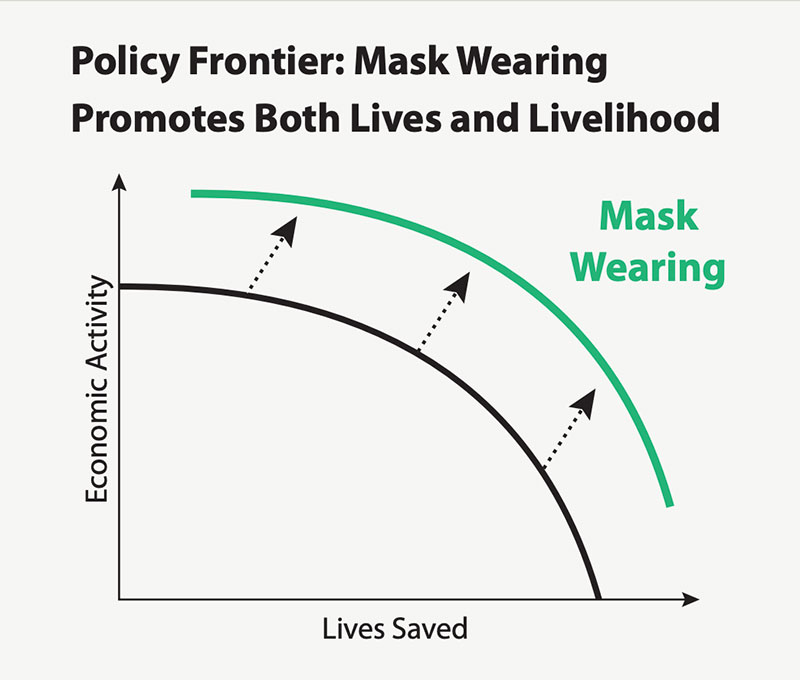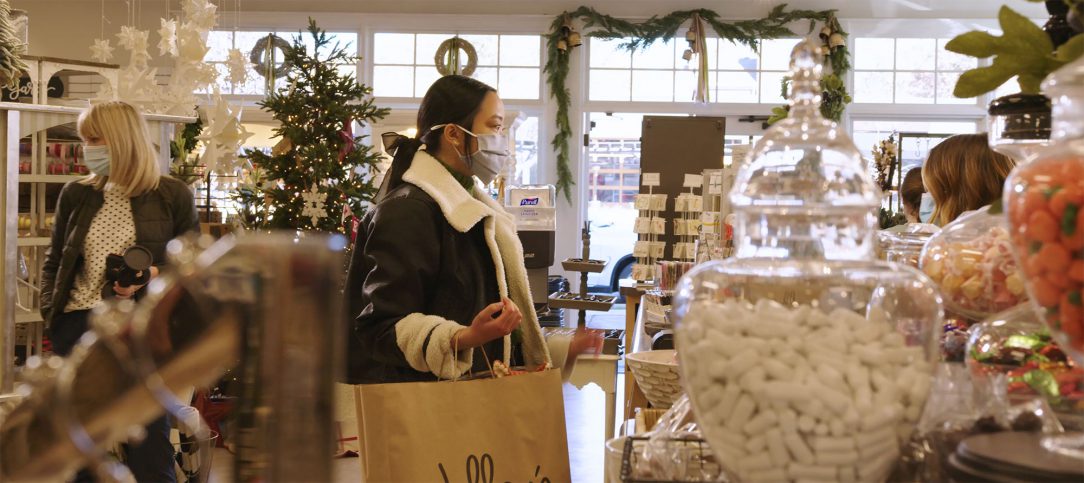The COVID-19 pandemic has taken a tremendous toll on individuals, families, communities, and businesses. Economic activity and health outcomes are tightly connected. Economies thrive when people feel and are safe.
One of the simplest ways to protect lives and livelihoods is by wearing a face mask. Nearly all reputable medical and scientific organizations agree that masks are an effective way to stop the spread of COVID-19.1 A recent study by the Centers for Disease Control and Prevention showed not only do masks protect other people from getting infected with the virus that causes COVID-19, but that masks can also be protective for the person wearing a mask.2 Mask-wearing decreases the number of COVID-19 cases, increases consumer mobility, and increases consumer spending.
Consumer confidence is linked to the number of COVID-19 cases.3,4
Health and economics go hand in hand. Studies show that as the number of COVID-19 cases grow, consumer confidence declines. When consumers feel safe, they are more likely to engage in the economy. People who believe they can protect themselves from the virus while out in public have higher consumer confidence and are more likely to spend discretionary income, especially in industries hit hardest by the pandemic. A study by Franklin Templeton and Gallup showed these individuals are twice as likely to dine out, visit a gym, visit a salon or barbershop, or book a flight as those who do not feel confident they can avoid infection while out in public.
People feel less financially optimistic and are more likely to be cautious when cases are surging. Businesses can play a role in helping consumers feel safe by following public health recommendations, including support of mask wearing. State mask mandates, anticipating extreme consequences from COVID-19, and misperception of the severity of the virus all impact consumer confidence. Following public health guidelines can and will spur economic growth.
Mask mandates positively impact the economy.5
A recent study by the University of Utah David Eccles School of Business showed that low COVID-19 case counts and mask requirements positively impact consumer activity. Counties and states which have mask mandates see higher levels of consumer spending than areas which do not have mask mandates. This same study found Utahns were 13% more likely to go to the store if COVID-19 cases fell by 10%. Utahns were also 51% more likely to go to the store if everyone was wearing a mask. Consumer mobility, or the movement within an economy, has a direct tie to how safe consumers feel during the pandemic. Until a vaccine is widely available, supporting mask wearing is the quickest and most effective way to sustain economic growth and activity.

Wearing a mask doesn’t just save lives, it saves money.6,7
Mask mandates have been shown to increase mask use, lower the number of new COVID-19 cases, and save lives. However, improved health outcomes are not the only benefit to wearing face masks. People living in states with mask mandates for employees were more likely to be confident they could protect themselves from COVID-19, which leads to higher consumer confidence. An economic analysis by Goldman Sachs found that universal masking in the U.S. could prevent the need for lockdowns and reduce economic losses of up to $1 trillion or about 5% of the U.S. gross domestic product.
Individuals would also benefit financially by face mask use. Economists have shown that as the GDP falls, consumers see higher prices for goods and services. Jobs also disappear during times of economic downturn. Goldman Sachs estimates that if universal masking prevents a 5% loss to the GDP, Americans would save roughly $3,000 per person.
1 https://pws.byu.edu/covid-19-and-masks
2 https://www.cdc.gov/coronavirus/2019-ncov/more/masking-science-sars-cov2.html
4 https://news.gallup.com/poll/321485/confidence-avoiding-covid-linked-consumer-behavior.aspx
6 https://www.cdc.gov/coronavirus/2019-ncov/more/masking-science-sars-cov2.html
7 https://www.goldmansachs.com/insights/pages/face-masks-and-gdp.html

